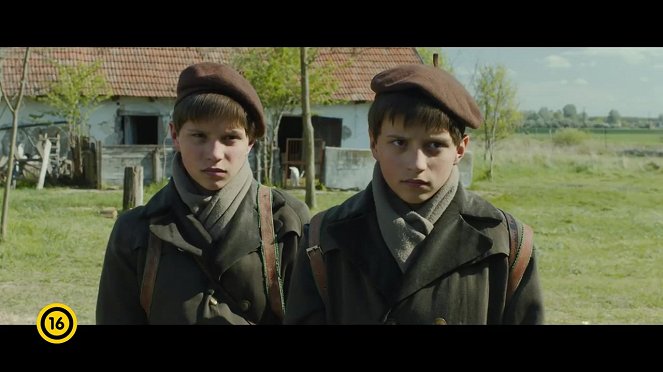Réalisation:
János SzászPhotographie:
Christian BergerActeurs·trices:
András Gyémánt, László Gyémánt, Piroska Molnár, Ulrich Matthes, Ulrich Thomsen, Lajos Kovács, Orsolya Tóth, János Derzsi, Miklós Székely B. (plus)VOD (1)
Résumés(1)
Les Nazis sont entrés en Hongrie et la guerre fait rage dans les grandes villes. Pour l'éviter, une femme dépose ses jumeaux de 13 ans chez leur grand-mère, qu'ils ne connaissent pas, à la campagne. Celle-ci, vieille femme méchante, sale et avare, les admet tout juste chez elle. Les deux enfants, livrés à eux-mêmes, vont apprendre à surmonter le froid, la faim et les cruautés quotidiennes dans un pays dévasté. Afin de se protéger, ils vont rejeter toute morale voire toute valeur et, bien malgré eux, se construire les leurs pour tenter de survivre... Le « grand cahier » est celui dans lequel les deux enfants s'astreignent à rédiger avec la plus grande objectivité possible leurs découvertes et leurs apprentissages. (Pretty Pictures)
(plus)Critiques (1)
Yes, Szász really did not live up to his reputation as an uncompromising and original filmmaker that he had in the 1990s. The Notebook looks more like an Eastern European HBO production - a relatively intimate expedition, repeating the same locations, and the fact that it is directed relatively sedentarily. If I deviate from these secondary categories, I also have complaints about the script, which is too dependent on the book by Ágota Kristóf. On the one hand, he draws harsh and raw monologues from it, on the other hand, he sometimes quite roughly motivates what seemed to look natural in the book. Nevertheless, Szász conquered me with these lessons in hardness, renunciation and suffering. The central duo of "wolves" is excellent, the grandmother is sweet and some of the supporting characters are irresistible. In particular, the middle of the film, in which the ruin of maternal love intertwines with the flow of swearing and drastic scenes, only captured artistically in a notebook, is amazing. War penetrates the boys' world as a reflection, and they fight their own war in order to defeat emotions and uproot all love. The stream of blows and deviant episodes, culminating in a drastic act, exudes a musty, unpleasant atmosphere that remotely resembles Haneke's The White Ribbon. It’s too bad about the unfinished stylization, but it’s still a significant experience.
()

